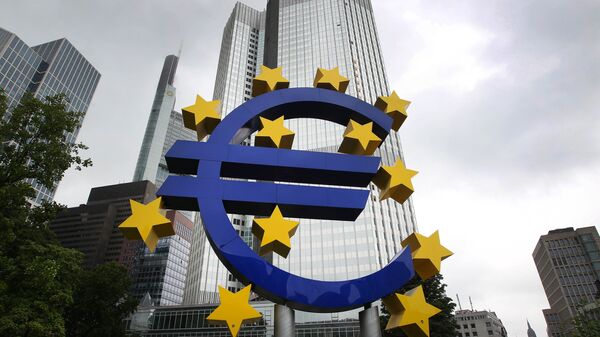Sputnik: How did Germany and the Netherlands manage to benefit from the euro while other countries didn’t?
David Coker: The economies of both Germany and The Netherlands are outward-looking and export-driven, so a weaker Euro benefits these nations disproportionately compared to other European economies. For example, in France services account for some 71% of GDP and services don’t benefit as much from a weaker currency as manufacturing. In other words, while products that are exported are directly substituteable across nations, services aren’t.
Sputnik: According to the report, one of the main reasons for the drop in the prosperity of the other countries was international competitiveness. What role has the introduction of the euro played?
David Coker: If an economy is more inward-looking, a weaker Euro will render imports more expensive, but bring little to no benefits. Compare to an outward-looking, export-driven economy — as the Euro drops in value, exports increase, offsetting any increased costs the weaker currency brings in the form of more expensive imports.
The Euro was badly implemented. One currency exchange rate can’t apply to such disparate economies as we see in The Eurozone.
READ MORE: Bumpy Road: Euro's Fate in Limbo After 20 Years of Existence
Sputnik: According to the report, the devaluation of currencies serves as a universal tool to make exports cheaper. Is this indeed so? How does this affect taxpayers and other sectors of the economy?
David Coker: Yes, a weaker currency makes a nation’s exports more competitive. Other sectors, in theory, should benefit as tax revenue increases.
READ MORE: Eurozone Price Index Rises in January, Industry Slides Into Contraction
Sputnik: If all other countries were able to devalue their currencies, what consequences could this lead to?
David Coker: If all other nations were to devalue, we’d see no competitive advantage being gained from the relatively weaker currency. However, this would likely cause economic distress in many nations, as a stronger currency is a function of many factors, for example, domestic interest rates. To maintain a weaker currency some nations may find it necessary to lower interest rates. This would lower the cost of capital in these nations, likely trigger domestic inflation and effectively punish savers. It also likely would lead to financial instability across many aspects of business. A lower cost of capital historically has led to asset bubbles and we know bubbles don’t slowly deflate — they burst. And with historically damaging consequences e.g., America’s housing bubble in the early 2000s.
The views and opinions expressed in this article are solely those of the speaker and do not necessarily reflect Sputnik's position.





